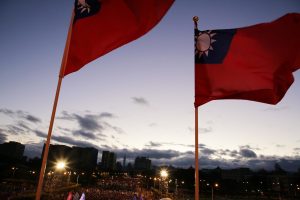Taiwan held local elections for mayor/county magistrates and city council members on November 26. As many had predicted, the ruling party, the Democratic Progressive Party (DPP), did not fare well. The number of DPP-controlled cities and counties narrowed further, from six to five, and its vote share drooped by around 5 percent compared to the party’s performance in the last midterm election in 2018.
The DPP’s performance is alarming, considering that Tsai Ing-wen will step down after serving two terms as president in 2024, and preparations for the presidential race will be underway soon. What does the result of the election say about cross-strait relations?
Several reasons, directly and indirectly, contributed to DPP’s limited success in this election. A primary reason was the party losing many of its supporters, especially those with a college degree and above or living in metropolitan areas in Taiwan, from the presidential election in 2020. Relatedly, the voter turnout rate was only 61 percent this time, and in the six major cities, it was only 59 percent. Voter turnout was 75 percent for the 2020 presidential election. Even the 2018 midterm election had 1 million more voters than this year’s polls.
What drove voters away from the DPP? First, despite being lauded as a role model for fighting COVID-19 in the international society, Taiwan experienced some of its most severe waves of cases and spikes in deaths in recent months, resulting in mounting criticisms of the government. Thus, when the minister of health and welfare in the government decided to join the campaign and ran for mayor of Taipei, he was quickly engulfed in COVID-related criticism.
Second, negative campaigning was the dominant tactic in this election. For the past several months prior to the election, much media attention has been paid to several candidates’ academic degrees, plagiarism concerns in their theses, and misuse of government funds or subsidies. While the smearing could drive up inter-party rivalry to motivate partisans to vote, many independent voters were simply fed up or lost interest in this election altogether. The DPP was particularly hurt by a thesis plagiarism scandal, which led the party to replace its candidate for Taoyuan City. Although it was later revealed to the public that many candidates from different parties engaged in similar wrongdoings, as the incumbent, the DPP’s reputation was hit most severely.
Perhaps most damaging to the DPP in this election is the decoupling of anti-China sentiment and vote choice among voters. The DPP has been recognized undisputedly as the party that would stand up to China for years, and this election illustrates that the allure of such thinking only goes so far. It would, however, be erroneous to conclude from the results of this election that citizens in Taiwan are changing their attitudes toward China, as most surveys clearly show that most still consider themselves Taiwanese rather than Chinese. There is no evidence to suggest that the public is favoring China more than before.
Instead, in a local election with few implications for foreign policy, it is more difficult for the DPP to run on an anti-China platform. Pan-Blue politicians were also cautioned not to make moves that could be interpreted as pro-China in this election. Consequently, negative campaigning took over, and citizens turned their attention to issues related to their personal and economic interests and the government’s performance in fighting the pandemic.
Readers outside of Taiwan might struggle to make sense of the results of the election in Taiwan, as many might presume that a growing Chinese threat, coupled with the recent military exercises from China, should galvanize public support for the DPP. As the result of this election showed, the China factor played a limited role, while voters cared more about the local policies.
Going forward, this election will have a number of critical implications for Taiwan’s security. In terms of national security, the mayor/county magistrates are tasked with preparing and responding in a time of war. Having more pro-China or China-friendly leaders in these spots could greatly weaken and postpone the necessary steps for Taiwan’s security in the event of a conflict. For supporters of Taiwan in international society, Taiwan’s civil society and the government need to carefully communicate that the election does not mean the citizens in Taiwan favor or endorse China’s decisions in any way.
Aside from the concerns, the silver lining from this election is that the overwhelming victory by the pan-Blue camp might lessen the Chinese Communist Party’s pressure to coerce Taiwan militarily, as Beijing could now work with the pro-China parties to infiltrate Taiwan to change public opinion and perceptions of China. In this view, perhaps the recent election could offer Taiwan much-needed space to prepare itself for any contingencies.
Make no mistake here, however: According to multiple NGOs specializing in informational warfare such as the Doublethink Lab, China has been perfecting its tactics in using various information campaigns to influence and infiltrate Taiwan. Thus, although the prospects of a military conflict might be reduced temporarily, Taiwan needs to be more cautious than ever in confronting those malign activities.
The victory should also give pro-China parities little comfort, as the victorious candidates will be examined with close scrutiny by voters in Taiwan now that they are in power. Any missteps could swing the pendulum in favor of the DPP for the 2024 presidential election, especially when it all goes back to the debates on foreign policies and China policy in the general election. The political situation in Taiwan will be in flux for the forseable future.

































